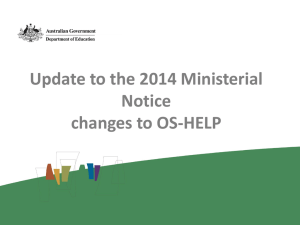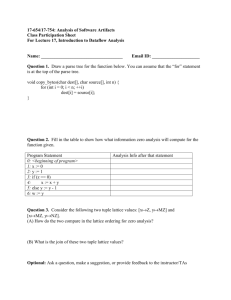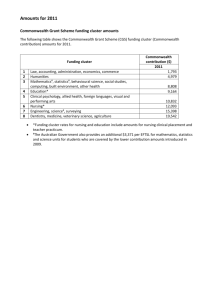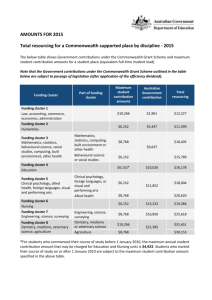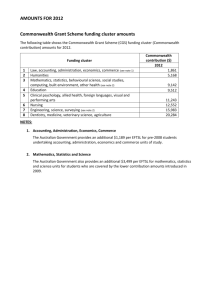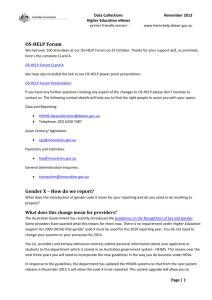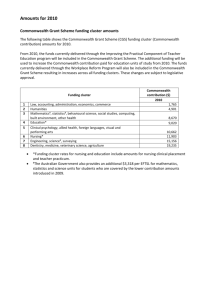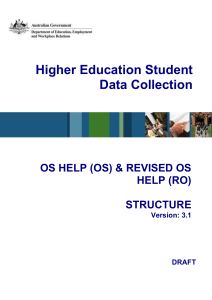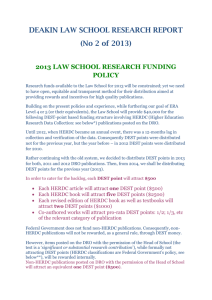Nelson Reforms Implementation
advertisement
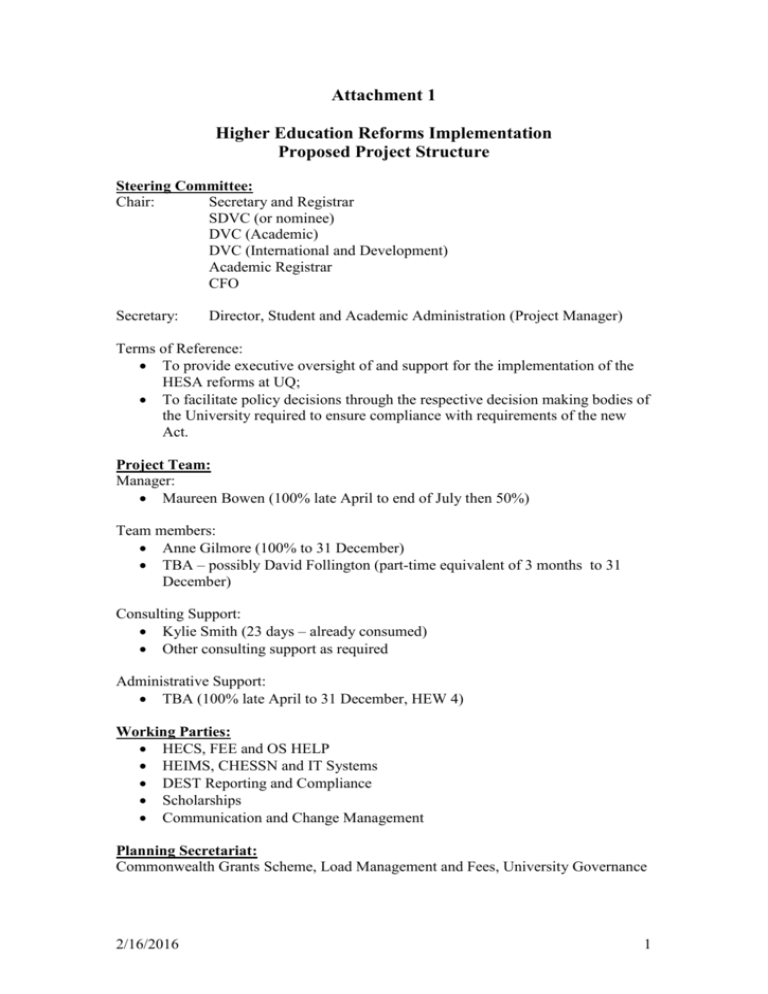
Attachment 1 Higher Education Reforms Implementation Proposed Project Structure Steering Committee: Chair: Secretary and Registrar SDVC (or nominee) DVC (Academic) DVC (International and Development) Academic Registrar CFO Secretary: Director, Student and Academic Administration (Project Manager) Terms of Reference: To provide executive oversight of and support for the implementation of the HESA reforms at UQ; To facilitate policy decisions through the respective decision making bodies of the University required to ensure compliance with requirements of the new Act. Project Team: Manager: Maureen Bowen (100% late April to end of July then 50%) Team members: Anne Gilmore (100% to 31 December) TBA – possibly David Follington (part-time equivalent of 3 months to 31 December) Consulting Support: Kylie Smith (23 days – already consumed) Other consulting support as required Administrative Support: TBA (100% late April to 31 December, HEW 4) Working Parties: HECS, FEE and OS HELP HEIMS, CHESSN and IT Systems DEST Reporting and Compliance Scholarships Communication and Change Management Planning Secretariat: Commonwealth Grants Scheme, Load Management and Fees, University Governance 2/16/2016 1 2/16/2016 2 FEE, HECS & OS HELP 1. Members Member David Follington (chair) Karen Wheeler Andrew Jell Geoff McClure Paul Rickards Anne Gilmore TBA Position Revenue Accountant, Business Services Division Senior Manager, Student Administration Functional Team Leader, SI-net Support Group Functional Analyst, SI-net Support Group HECS Officer, Business Services Division Business Analyst, Higher Education Reforms Implementation Project Student Exchange, International Education Directorate 2. Scope of Work The FEE, HECS & OS HELP Working Party is responsible for the following business processes and areas of change introduced by the Higher Education Support Act 2003: HECS-HELP processing FEE-HELP processing OS-HELP processing Remission of SLE and HELP debts Note: Issues related to SLE management may need to be included to the scope of work for this group. 3. Work Required The following sections should act as a starting point for the scope of effort required for the FEE, HECS & OS HELP Working Party. This list may be expanded as the group investigates the detail of the changes. Any questions relating to the scope of work for this Working Party should be directed to Maureen Bowen, Manager – Higher Education Reforms Implementation Project. University Rules Fee Rules Policies HUPP – Section 3 – Teaching and Learning Financial Management Practices Manual - Revenue Processes / Procedures Student Commonwealth assistance selection HECS-HELP and FEE-HELP processing Student invoicing 2/16/2016 3 OS-HELP application, assessment and financial processing HELP and SLE remission processing Commonwealth Assistance Notice processing and enquiries IT systems SI-net modifications for Student Status codes SI-net modifications to tuition processing and reconciliation to meet changes SI-net modifications for OS-HELP processing mySI-net electronic Request for Commonwealth Assistance Form (HECS-HELP, FEE-HELP, HECS-HELP for pre-2005 commonwealth assisted students) Commonwealth Assistance Notice Business Objects fields for new data records/fields Forms Impacted OS-HELP application form OS-HELP request for Commonwealth Assistance Form Communication Material MyAdvisor – Financial Matters MyAdvisor (various other areas) SI-net training Handbooks Initial Issues / Questions for Discussion The proposed HECS-HELP Commonwealth Assistance Forms do not include an election for the student to say whether they want to be upfront or deferred. Can this be included on the eCAF? If not, should mySI-net be modified to ask this question outside the eCAF so that invoicing can continuing based on student preference? How will pre-2005 HECS students be identified so they receive the correct eCAF? Admit term will be a key driver, but this needs to be evaluated depending on the HECS Transitional Guidelines provide for students that change program (eg. will the admit term change) or take a leave of absence (eg. will UQ set a limit on how long you can be on a LOA before you fall under the new rules)? How should partial payments be applied to HECS-HELP or FEE-HELP students, where that partial payment is sufficient to fully pay off at least one unit of study (and therefore require a student status change to be reported for that unit)? It can either be allocated as mentioned or can be allocated proportionally across all units of study. Advice has been sought from DEST through the Load/Liability validation feedback. Currently a TFLUGR tuition group exists for students who enrol very late and are forced to pay tuition fees at HECS rates. Under HESA, this cannot continue, therefore the business process must be determined for actioning these transactions (eg. process a HELP variation) 2/16/2016 4 Under the legislation, a HECS-liable student can elect to pay tuition fees for a particular course (eg. to save their SLE). As it is expected that this will be a rare occurrence until students have limited SLE remaining, it is recommended that this be treated as an exception. At this stage, UQ probably will not tackle the issue of moving Student Status down to the student enrolment level so how will these students be tracked, charged correctly and reported on the CAN and DEST reports (eg. manually charge fees, flag student somehow for reporting)? Who will be responsible for remission of HELP Debt and SLE? What guidelines need to be in place to enable decisions to be made? What interaction should exist with student administration making decisions on academic withdrawals? What system changes need to be made to facilitate DEST reporting? What business process needs to be implemented so that the previous HELP debt can be identified and the revised debt identified so that it can be included in the DEST reporting? The university needs to request OS-HELP allocations in June 2004. How will it determine how much it requests? What application process needs to exist for OS-HELP? What documentation will students that are not travelling on a formal exchange program need to provide to ensure they will receive credit for their studies? What guidelines need to be developed to determine allocation of OS-HELP funds to applicants? Will OS-HELP financials be processed through Student Financials or from an external system (eg. Accounts Payable)? If OS-HELP payments are not processed through SF customer account, new fields will be required in PS to store the data so what reconciliation processes/reports will be required to ensure the amounts reported on the CAN and DEST reports are the same as the amounts distributed to students from an external system? Does a student need to complete a 2nd Request for Commonwealth Assistance Form if they are applying for OS-HELP (ie. they will already have completed a form for HECS-HELP)? DEST have indicated that in future years they will want to report additional information about credit students received during the periods OS-HELP was granted. While these details are not currently known, what design decisions are required to ensure that the solution built now is extendable to include this information in future? Does the Commonwealth Assistance Notice need to be reissued during a period if there are different dates for confirmation (ie. must be issued 28 days after OS-HELP debt incurred date, earliest census date). Do you only show what has passed it’s official cut-off date on each notice (eg. if you have 2 courses with different census dates in the period, do you show the 2nd course on the first notice if its census date hasn’t arrived yet. Do both courses show on the 2nd notice). If the student has 14 days to respond, can they question items that were included on a prior notice? Does the FEE-HELP or OS-HELP loan fee need to be shown in the UQ student account or can it be stored elsewhere to be shown on the CAN and DEST reports? This fee represents no revenue to the university and therefore is not a financial transaction that needs to be processed through the university’s financial accounts. Advice has been sought from DEST (through the feedback on the draft OS-HELP guidelines) Transition Issues Can continuing HECS students elect to be under the post2005 rules for particular units of study (eg. if a particular unit of study had reduced student contribution, can 2/16/2016 5 the student elect to be under the new rules for that unit of study but under the old rules for the remainder of their program)? NB. This is not an issue if maximum student contribution is charged for all courses, as agreed by Senate for 2005. How will existing Loan election codes be transferred over to new Student Status codes? 4. Key Dates Date April 2004 April 2004 UQ proposed target date June 2004 UQ proposed target date September 2004 UQ proposed target date early October 2004 UQ proposed target date November 2004 December 2004 January 2005 Deadline FEE-HELP guidelines for review HECS and PELS transition guidelines for review HECS-HELP recommendations to Project Manager FEE-HELP recommendations to Project Manager OS-HELP recommendations to Project Manager PeopleSoft functional design due PeopleSoft 7.6 patch for Student Status code due PeopleSoft 7.6 patch for tuition calc, HECS reconciliation and PELs process due PeopleSoft 7.6 patch for OS-HELP due Implementation of Student Status code change into SI-net Implementation of tuition calc, HECS, PELS and OS-HELP changes into SI-net * UQ proposed target dates are for UQ’s planning purposes and have not been confirmed with the relevant external parties 5. Relevant Reference Material The following documents should be reviewed to determine impacts of the changes on UQ’s policies, rules, processes, systems and communication material: Higher Education Support Act 2003 http://scaleplus.law.gov.au/html/pasteact/3/3633/pdf/HigherEdSupport2003.pdf Relevant sections: o Chapter 3 Assistance to Students o Chapter 4 Repayment of loans o Chapter 5 Administration Relevant Guidelines Administration Guidelines http://www.backingaustraliasfuture.gov.au/guidelines/documents/admin_guide.pdf Student Learning Entitlement Guidelines http://www.backingaustraliasfuture.gov.au/guidelines/documents/sle_guidelines.pdf FEE-HELP Guidelines http://www.backingaustraliasfuture.gov.au/guidelines/documents/feehelp_guide.pdf OS-HELP Guidelines http://www.backingaustraliasfuture.gov.au/guidelines/documents/oshelp_guide.pdf HECS Transitional Guidelines http://www.backingaustraliasfuture.gov.au/guidelines/documents/trans_guide.pdf 2/16/2016 6 PELS Transitional Guidelines – the same document as for HECS Transition Other Documents Issue 2 – Managing Commonwealth Supported Places (HEIMSBAC meeting 10-11 March 2004) Issue 3 – HECS-HELP (HEIMSBAC meeting 10-11 March 2004) Issue 4 – FEE-HELP (HEIMSBAC meeting 10-11 March 2004) Issue 5 – OS-HELP (HEIMSBAC meeting 10-11 March 2004) 2/16/2016 7 2/16/2016 8 HEIMS/CHESSN AND IT SYSTEMS 1. Members Member Noela Meier (chair) Ian Holmes Andrew Jell Mina Singh Anne Gilmore Tuan Dai 2. Position Associate Director, ITS Senior Manager, SI-net Projects Functional Team Leader, SI-net Support Group Functional Analyst, SI-net Support Group Business Analyst, Higher Education Reforms Implementation Project Development Team Leader – SI-net Support Group Scope of Work The HEIMS/CHESSN Working Party is responsible for the following business processes and areas of change introduced by the Higher Education Support Act 2003: CHESSN allocation and management SLE and FEE-HELP balance validation HEIMS interface for CHESSN allocation HEIMS interface for SLE and FEE-HELP balance validation 3. Work Required The following sections should act as a starting point for the scope of effort required for the HEIMS/CHESSN Working Party. This list may be expanded as the group investigates the detail of the changes. Any questions relating to the scope of work for this Working Party should be directed to Maureen Bowen, Manager – Higher Education Reforms Implementation Project. Policies N/A Processes / Procedures CHESSN allocation during application Deletion of provisional CHESSNs Maintenance of duplicate CHESSNs IT systems SI-net fields/panels to capture CHESSN, SLE balance and FEE-HELP balance SI-net / HEIMS interface for CHESSN allocation QTAC / SI-net interface for CHESSN, SLE balance and FEE-HELP balance CHESSN deletion process for provisional CHESSNs Business Objects fields for new data records/fields 2/16/2016 9 Forms Impacted Application Form Communication Material MyAdvisor Prospectus’ Initial Issues / Questions for Discussion Can the university request a CHESSN from students who have already been issued CHESSNs? Can this be sent to HEIMS to request SLE and FEE-HELP balance and if so, are there any validation or processing issues if some of the HEIMS data is different (eg. address)? Who should be able to enter/modify CHESSNs, particularly as this is the key identifier for HEIMS and if it is not carefully managed, could cause duplicate CHESSN issues or incorrect reporting to DEST? If SLE and FEE-HELP balance are captured in SI-net, what can these values be used for? What advice can UQ staff provide to the students about their SLE and FEE-HELP balances? When should CHESSNs be allocated to continuing students (ie. late 2004 as a separate exercise or during enrolment in 2005)? Is batch allocation of CHESSNs sufficient for admissions processing? Students may elect that their data cannot be sent to HEIMS (and therefore they will not be entitled to Commonwealth assistance). How will this be captured in SI-net? Future Issues for Noting 2/16/2016 Impacts of remaining SLE or FEE-HELP balance on admissions processing and offer letters (ie. advice that balance remaining may not cover entire program) Impacts of remaining SLE or FEE-HELP balance on enrolment processing (ie. how frequently during the open enrolment period do you check balances, what actions must be taken if a student enrols in more than their balance allows and need to make tuition fee payments) Impacts of rolling census dates across institutions which means that SLE and FEE-HELP balance may change continually throughout an enrolment period, invalidating what was previously checked as a valid enrolment. Impacts on timing of reporting for cross-institutional students where the SLE or FEE-HELP balance is sufficient for the student’s enrolment at UQ, but if another institution submits their DEST reports first, they may consume the remaining balance. What rules should be applied if the student is then liable for tuition fee payments very late in the semester (ie. issue may not be identified until June for semester 1) Impacts of duplicate CHESSN identified after DEST reports are submitted (ie. well after census date) and the CHESSN update results in identifying that the student did not have sufficient SLE or FEE-HELP balance for their enrolment to have been valid. What rules should be applied? How can HEIMS data be updated prior to DEST reporting if key data matching fields have changed? For example, an applicant provides their CHESSN and UQ 10 4. sends the data to HEIMS to retrieve SLE and FEE-HELP balance. HEIMS performs a data validation and returns an error on name, which is due to the applicant changing their name through marriage since their prior tertiary study. How does the student’s name get updated in HEIMS (in a timely manner) so that UQ can retrieve their balances and make an offer for admissions? Is there a need for real-time checking of SLE and FEE-HELP balances during enrolment and program change processes (not an issue until remaining balances may impact student behaviour)? Key Dates Date UQ target May 2004 UQ target June 2004 UQ target August 2004 UQ target September 2004 September 2004 September 2004 November 2004 Deadline DEST file specifications released for HEIMS CHESSN allocation interface PeopleSoft functional design due PeopleSoft 7.6 patch for HEIMS CHESSN allocation interface and QTAC interface due Implementation of HEIMS CHESSN allocation interface into SInet Test and signoff HEIMS CHESSN allocation interface with DEST Communication to continuing students about process for allocation of CHESSN Implementation of QTAC interface changes into SI-net * UQ proposed target dates are for UQ’s planning purposes and have not been confirmed with the relevant external parties 5. Relevant Reference Material The following documents should be reviewed to determine impacts of the changes on UQ’s policies, rules, processes, systems and communication material: Higher Education Support Act 2003 http://scaleplus.law.gov.au/html/pasteact/3/3633/pdf/HigherEdSupport2003.pdf Relevant sections: o Chapter 5 Administration Relevant Guidelines Administration Guidelines http://www.backingaustraliasfuture.gov.au/guidelines/documents/admin_guide.pdf Business Requirements – CHESSN Interface with Higher Education Providers v5.0 Issue 1 – CHESSN Allocation (HEIMSBAC meeting 10-11 March 2004) CHESSN Impacts at Southern Cross University (HEIMSBAC meeting 10-11 March 2004) 2/16/2016 11 2/16/2016 12 DEST REPORTING AND COMPLIANCE 1. Working Party Members Name Maureen Bowen Andrew Jell Kathleen McDonnell Anne Gilmore Karen Wheeler 2. Position Director, Student Administration Functional Team Lead, SI-net Support Group Management Information Section Analyst, Higher Education Reforms Implementation Project Senior Manager – Student Administration Areas of Responsibility The DEST Reporting and Compliance Working Party is responsible for the following business processes and areas of change introduced by the Higher Education Support Act 2003: DEST reporting 3. Work Required The following sections should act as a starting point for the scope of effort required for the DEST Working Party. This list may be expanded as the group gets into the detail of the changes. Policies UQ Census dates and study periods Full year course management Processes / Procedures DEST reporting IT systems SI-net records to capture data required for DEST SI-net SQRs for DEST reporting Business Objects surveillance queries Forms Impacted N/A Communication Material 2/16/2016 SI-net training materials 13 Issues / Questions for Discussion 2/16/2016 How are full year courses to be handled, as the current DEST advice is that they are to only have one census date and therefore will report significant skews in the DEST reporting (which has associated impacts for international student visa requirements, Centrelink requirements, etc)? Should UQ campus or location be reported in E477 (Campus postcode)? This has impacts on regional loading for the university as well as the value will be displayed on the DEST public portal to describe where a course (unit of study) is taught. What is the difference between course of study and course as defined in the legislation and as defined in the DEST element definitions? Currently, it appears SI-net programs would equate to a course of study and SI-net plans would equate to a course. This needs to be confirmed and a review of the SI-net programs should be performed to ensure each program represents an award (and no 2 programs lead to the same award) How will work experience in industry courses be flagged in the future? If the current proposal continue (ie. that WEI is flagged through student status code), what changes need to be made to the DEST SQRs to accommodate this? The element definition for basis of admission E327 has changed. What impact does this have on the admissions/change program processes and configuration? The element definition for permanent residence status E390 has changed. This has never worked correctly in SI-net as this attribute should be linked to a student’s program. What needs to be changed within PeopleSoft to meet the new rules? Highest attainment E493 has been introduced to removed a series of elements previously reported about prior studies. What changes need to be made to the PeopleSoft panels and mySI-net to accommodate this change? Mode of attendance E329 is now to be reported at the unit of study level (PS course) in the Load/Liability file and at the course level (PS program) in the Past Course Completions file. Should the extract for the Load/Liability file be updated to look at the course location rather than using the program mode of attendance field? The Load/Liability file now has a lot of data to be reported at the unit of study level rather than at the program level. However, this file still includes AOU code and therefore the data may need to be split even lower based on the percentage ownership of academic organisations. This could result in rounding issues and the approach needs to be confirmed with DEST. What number of decimal places should EFTSL be reported to? The SLE guidelines are not clear. Whatever decision is made must be consistent across the various areas in SI-net that EFTSU is calculated so that issues do not arise due to different accuracy and rounding approaches across the system. In addition to these questions, various questions have been put to DEST as a result of the review of the draft DEST validations (both by UQ and by some other institutions). These need to be compiled and reviewed once direction is given by DEST. How will submission X be handled for census dates between 1 October 2004 and 31 December 2004? Will courses delivered late in summer semester 2004 be included in submission X or will they be included in period 1 2005 (dependent on outcome of policy decision regarding census dates)? For future noting, what schedule will UQ use for reporting files (also dependent on the decision regarding census dates)? The schedule for 2005 has been mapped 14 out by DEST but for 2006, the university will have more flexibility in its reporting timelines. Will the current schedule continue to be used or will certain groups of students (eg. research students, short courses) be reported on a different schedule? 4. Key Dates Date UQ proposed target date June 2004 July 2004 UQ proposed target date December 2004 February 2005 March 2005 UQ proposed target date March 2005 May 2005 Deadline Policy decision regarding census dates Recommendations to Project Manager of impacts of HE Reforms on DEST reporting PeopleSoft patch for DEST reporting (HELP Due, Load Liability files) due UQ development of eCAF DEST file completed DEST reporting changes (eCAF, HELP Due, Load Liability files) go live in SI-net PeopleSoft patch for DEST reporting (other files) due DEST reporting changes (other files) go live in SI-net * UQ proposed target dates are for UQ’s planning purposes and have not been confirmed with the relevant external parties 5. Relevant Reference Material The following documents should be reviewed to determine impacts of the changes on UQ’s policies, rules, processes, systems and communication material: Higher Education Support Act 2003 http://scaleplus.law.gov.au/html/pasteact/3/3633/pdf/HigherEdSupport2003.pdf Relevant sections: o Chapter 5 Administration Relevant Guidelines Administration Guidelines http://www.backingaustraliasfuture.gov.au/guidelines/documents/admin_guide.pdf 2/16/2016 <latest version of data elements> 15 2/16/2016 16 Scholarships 1. Working Party Members Name Maureen Bowen Anne Gilmore Adriana Jumelet Ann Stewart Anna Cotroneo 2. Position Director, Student Administration Analyst, Higher Education Reforms Implementation Project Coordinator, Undergraduate Scholarships and Prizes Director, Equity Office Acting CLS Administrator Areas of Responsibility The Scholarships Working Party is responsible for the following business processes and areas of change introduced by the Higher Education Support Act 2003: Commonwealth Learning Scholarships Indigenous Staff Scholarships APAs and IPRS 3. Work Required The following sections should act as a starting point for the scope of effort required for the Scholarships Working Party. This list may be expanded as the group gets into the detail of the changes. Note: It is understood that APA and IPRS Guidelines remain largely unchanged from the current programs. The extent of work required by the Working Party in relation to these scholarships will be to refer them to ORPS for review and advice concerning any processes that may need to be changed for 2005. Policies Grievance Procedures Appeals to Senate by Students Processes / Procedures CLS application and selection process UQ CLS Guidelines Appeal mechanisms Review Guidelines for Commonwealth Scholarships for 2005 Develop student tracking reports Liaise with ATSIS Unit, Personnel and ORPS regarding implications for implementation of Indigenous Staff Scholarships (ISS) Reconciliation of ISS payments to DEST Administering Provider Reporting and Notice Requirements to DEST re ISS 2/16/2016 17 IT systems SI-net records to capture data required for CLS reporting Aurion or ORPS system to facilitate payment of stipend Business Objects data requirements and reports Forms Impacted CLS Application forms (combined with other UQ application forms?) Communication Material My.Advisor Prospectus’ Prizes and Scholarships Database (when developed) for web publication Information to Indigenous staff re ISS Issues / Questions for Discussion 4. How will UQ best manage appeals related to CLS allocation? How will CLS student progress be tracked? How will applications for CLS be linked to the application process for other UQ scholarships (eg Go8)? How will ISS compliance be monitored and reported? Who will prepare the ISS advices and notices as required in the Guidelines? How will ISS payments to students be managed eg via existing ORPS scholarships functionality or via Aurion payroll? Key Dates Date 30 April 2004 May 2004 May 2004 28 May 2004 July 2004 July 2004 July 2004 UQ proposed target date August 2004 September 2005 Deadline Provide feedback to DEST on ISS Develop Appeal Process Develop detailed UQ CLS Guidelines Provide feedback to DEST on 2005 CLS Guidelines Recommendations to Project Manager of impacts of and APA or IPRS changes Decide how ISS will be paid Allocate responsibilities for ISS compliance checking and reporting PeopleSoft patch for CLS reporting due Decide on changes to application forms and selection process for 2005 CLS round * UQ proposed target dates are for UQ’s planning purposes and have not been confirmed with the relevant external parties 2/16/2016 18 5. Relevant Reference Material The following documents should be reviewed to determine impacts of the changes on UQ’s policies, rules, processes, systems and communication material: Higher Education Support Act 2003 http://scaleplus.law.gov.au/html/pasteact/3/3633/pdf/HigherEdSupport2003.pdf Relevant sections: o Chapter 2 Part 2 – 4: Grants for Commonwealth Scholarships o Subdivision 19-D – The fairness requirement Relevant Guidelines Guidelines for Commonwealth Scholarships http://www.backingaustraliasfuture.gov.au/guidelines/documents/scholarship_guide.pdf Working papers – DEST CLS Workshop – Canberra, February 2004 2/16/2016 19 2/16/2016 20 Communication and Change Management 1. Working Party Members Name Colleen Clur Lisa Gaffney TBA Kim Lamb Anne Gilmore 2. Position Director, Office of Marketing and Communication Dean of Students Other OMC staff Senior Manager – Academic Administration (SASD Web Editor) Analyst, Higher Education Reforms Implementation Project Areas of Responsibility The Communication and Change Management Working Party is responsible for the following activities related to the Higher Education Support Act 2003: Communication of changes to staff, students and prospective students Providing advice to SSG and the University Staff Development Committee on any changes that may be required to existing staff training materials Preparing information for display on the DEST Public Portal regarding UQ fees and programs 3. Work Required The following sections are intended to act as a starting point for the scope of effort required for the Communication and Change Management Working Party. This list may be expanded as the group gets into the detail of the changes. Policies N/A Processes / Procedures 2/16/2016 Facilitate a review of material in all current hard copy and electronic media that may require updating to take account of HESA changes including: o Prospectus’ o UQ web sites o QTAC Guide o UQ Offfer materials o Faculty web sites and publications o UQ Union Web site o Training materials Develop communication plan to ensure broad dissemination of information about the HESA reforms Consider implications for staff training Consider implications for 21 IT systems Consider any changes required to the Programs and Courses web site Forms Impacted N/A – should be addressed by relevant working parties Possible Communication Material/Strategies My.Advisor Fortnightly updates in UQ Update or SASD Weekly Open staff forums Emails to staff and students News items on my.UQ Hard copy newsletter to staff – at key points Issues / Questions for Discussion 4. How will updates to training of staff be manged? Key Dates Date January 2004 Deadline Advice to commencing students regarding deferment until 2005 * UQ proposed target dates are for UQ’s planning purposes and have not been confirmed with the relevant external parties 5. Relevant Reference Material The following documents should be reviewed to determine impacts of the changes on UQ’s policies, processes, systems and communication material: TBA 2/16/2016 22
